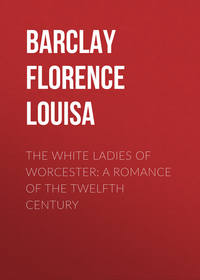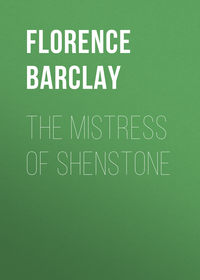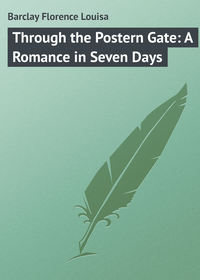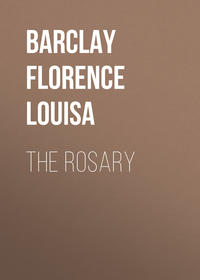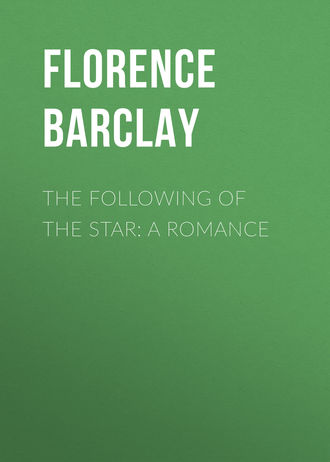 полная версия
полная версияThe Following of the Star: A Romance
"Then I walked over to the window, and stood looking out at the sleet and drizzle, the leafless branches, the sodden turf, the dank cold deadness of all things without. Ah, what did they matter, with such love, such bliss, such resurrection within!
"David, I have always said I did not like children. For years I have derided the sacred obligation of motherhood. I have often declared that nothing would induce me, under any circumstances, to undertake it. At last, by my own act, I have put myself into a position which makes it impossible that that love, that tie, that sweet responsibility, should ever be mine. I don't say, by any means, that I wish for it; but I have felt lately that my former attitude of mind in the matter was wrong, ignorant, sinful.
"And – oh, how can I make my meaning plain – it seemed to me that in that moment, when I put that little child into those waiting arms, without kissing her myself – I expiated that mental sin. I shall always have a hungry ache at my heart, because I gave Little Fairy up without kissing her; but that very hunger means conviction, confession, and penance. I shall never have a little child of my own; but I have experienced something of the rapture of motherhood, in sharing in this meeting between my little baby-girl, and the mother I had thought dead.
"And now, David, I will tell you a secret. Had the father arrived home, with the awful news, I had meant to ask leave to adopt Little Fairy. But you see I am not intended even to have other people's children for my own.
"After a while, as I stood at the window, I heard the mother say: 'Darling, dear father has not come home.'
"'Oh,' said Fairy's contented little voice; asking no questions.
"'Darling,' insisted the quiet tones of the mother, 'dear father has gone to be with Jesus.'
"I looked round. The baby-face was earnest and thoughtful. She lifted great questioning eyes to her mother.
"'Oh,' she said. 'Did Jesus want him?'
"'Yes,' said the sweet voice, controlling a sudden tremor. 'Jesus wanted him. So we have lost dear father, darling.'
"Then Fairy knelt up on her mother's knee, and put both little arms round her mother's neck, with a movement of unspeakable tenderness.
"'But we've gotted each uvver, Mummie,' she said.
"Oh, David, we've gotted each other! It seemed just everything to that little heart. And I believe it was everything to the mother, too.
"Now, do you wonder that this has made me feel as if none of earth's happenings, however sad, need be altogether hopeless; no mistake, however great, is wholly irretrievable.
"Our own sad hearts may say: 'He has lain in the grave four days already.' But the voice of the Christ can answer: 'Lazarus, come forth!'
"Are you not glad this wonderful thing took place on the Feast of the Star?
"Affectionately yours,"Diana Rivers."It so happened that David had a sharp bout of fever soon after the arrival of this letter. His colleague wondered why, in his delirium, he kept on repeating: "When I am dead, she can have a Fairy of her own! She can have a little Fairy, when I am dead!"
CHAPTER XXXI
"I CAN STAND ALONE"
In the early summer following the first anniversary of their wedding-day, Diana's anxiety about David increased.
His letters became less regular. Sometimes they were written in pencil, with more or less incoherent apologies for not using ink. The writing was larger than David's usual neat small handwriting; the letters, less firmly formed.
After receiving one of these, Diana experimented. She lay upon a couch, raised herself on her left elbow, and wrote a few lines upon paper lying beside her. This produced in her own writing exactly the same variation as she saw in David's.
She felt certain that David was having frequent and severe attacks of fever; but he still ignored all questions concerning his own health; or merely answered: "All is well, thank you"; and Diana had cause to fear that this answer was given in the spirit of the Shunammite woman who, when Elisha questioned: "Is it well with the child?" answered: "It is well"; yet her little son lay dead at home.
In June, Diana wrote to David's colleague, asking him privately for an exact account of her husband's health. But the colleague was loyal. David answered the letter.
As usual, all was well; but it was not well that Diana had tried to learn from some one else a thing which she had reason to suppose David himself did not wish to tell her. He wrote very sternly, and did not veil his displeasure.
Womanlike, Diana loved him for it.
"Oh, my Boy!" she said, smiling through her tears; "my David, with his thin, white face, tumbled hair, and boyish figure! Sick or well, absent or present, he would always be master. I must try Sir Deryck."
But she got nothing out of her friend the doctor, beyond a somewhat stiff reminder that he had told her on her wedding-day that her husband ought to return from Central Africa within the year. Had she really allowed him to go, without exacting a promise that he would do so? He might live through two years of that climate; but his constitution could not possibly stand a third.
Her question, as to whether Sir Deryck had received recent news of David's health, remained unanswered.
Diana felt annoyed and indignant. A naturally sympathetic man is expected to be unfailingly sympathetic. But the doctor was strong as well as kind. He had been perplexed by the suddenly arranged marriage; surprised at David's reticence over it; and when he realised that David was sailing, without his bride, on the afternoon of his wedding-day, he had been inclined to disapprove altogether.
Diana sensed this disapproval in the doctor's letter. It hurt her; but it also stimulated her pride, toward him, and, in a lesser degree, toward David. That which they did not choose to tell her, she would no longer ask.
She was acquainted with at least half a dozen women who, under similar circumstances, would have telegraphed for an appointment, rushed up to town, and poured out the whole story to Sir Deryck in his consulting-room.
But Diana was not that kind of woman. Her pain made her silent. Her stricken heart called in pride, lest courage should fail. The tragic situation was of her own creating. That which resulted therefrom, she would bear alone.
She could not see herself a penitent, in the green leather armchair, in Sir Deryck's consulting-room. A grander woman than she had sat there once, humbled to the very dust, that she might win the crown of love. But Diana's strength was of a weaker calibre. Her escutcheon was also the pure true heart, but its supporters were Courage on the one side, and Pride on the other; her motto: "I can stand alone."
So she lived on, calmly, through the summer months, while David's letters grew less and less frequent; and, at last, in October, the blow fell.
CHAPTER XXXII
THE BLOW FALLS
In October, during the second autumn of their married life, the blow fell.
A letter came from David; very clear, very concise, very much to the point; written in ink, in his small neat writing.
"My dear Wife – " wrote David, "I hope you will try to understand what I am about to write and not think, for a moment, that I under-value the pleasure and help I have received from our correspondence, during the year and nine months which have elapsed since my departure from England. Your letters have been a greater cheer and blessing than you can possibly know. Also it has been an untold help to be able to write and share with you, all the little details of my interests out here.
"I am afraid these undeniable facts will make it seem even stranger to you, that I am now writing to ask that our correspondence should cease.
"I daresay you have noticed that my letters lately have been irregular, and often, I am afraid, short and unsatisfactory. The fact is – I have required all my remaining energy for the completion of my work out here.
"I want to bid you farewell, my wife, while I still have strength to write hopefully of my present work, and joyously of the future. I will not, now, hide from you, Diana, that my time here is nearly over. Do you remember how I said: 'I cannot promise to die, you know'? I might have promised, with a good grace, after all.
"This will be the last letter I shall write; and when you have answered it, do not write again. I may be moved from here, any day; and can give you no address.
"You must not suppose, my wife, that, owing to the ceasing of our correspondence, you will be left in any uncertainty as to when the merely nominal bond which has bound us together is severed, leaving you completely free.
"I have written you a letter, which I carry, sealed and addressed, in the breast pocket of my coat. It bears full instructions that it is to be forwarded to you immediately after my death. A copy of it is also in my despatch-box; so that – in case of anything unforeseen happening to my clothes – the letter would without fail be sent to you, so soon as my belongings came into the hands of our Society.
"This letter is not, therefore, my final farewell; so I do not make it anything of a good-bye; though it puts an end to our regular correspondence. And may I ask you to believe that there is a reason for this breaking off of our correspondence; a reason which I cannot feel free to tell you now; but which I have explained fully, in the letter you will receive after my death? If you now find this step somewhat difficult to understand, believe me, that when you have read my other letter, you will at once admit that I could not do otherwise. I would not give your generous heart a moment's pain; even through a misunderstanding.
"And now, from the bottom of my heart, may I thank you for all you have done for me and for my work? Any little service I was able to render you, was as nothing compared with all you have so generously done for me, and been to me, since the Feast of Epiphany, nearly two years ago.
"Your help has meant simply everything to the work out here. I am able to feel that I shall leave behind me a fully established, flourishing, growing, eager young Church. My colleague is a splendid fellow, keen, earnest, and a good churchman. If you feel able to continue your support, he will be most grateful, and I can vouch for him as did the Jews of old, for the Roman centurion: 'He is worthy, for whom thou shouldest do this thing.'
"And, oh, if some day, Diana, you yourself could visit the Church of the Holy Star! Some day; but not yet.
"For this brings me to the closing request of my letter.
"I cannot but suspect that your kind and generous heart may incline you – as soon as you receive this letter, and know that I am dying – to come out here at once, in order to bid a personal farewell to your friend.
"Do not do so. Do not leave England until you receive word of my death. I have a reason, which you will understand by and by, for laying special stress upon this request; in fact it is my last wish and command, my wife. (I have not had much opportunity for tyranny, have I?)
"How much your sympathy, and gay bright friendship, have meant to me, in this somewhat lonely life, no words can say.
"Just now I wrote of the time, so soon coming, when the nominal bond between us would be severed, leaving you completely free. You must not even feel yourself a widow, Diana; because you will not really be one. I have called you my 'wife,' I know; but it has just been a courtesy title. Has n't it?
"Yet – may I say it? – I trust and believe the very perfect friendship between us will be a lasting link, which even death cannot sever. And there is a yet closer bond: One Lord, one Faith, one Baptism. This is eternal.
"So – I say again as I said, with my hands on your bowed head, on that Christmas night so long ago, before we knew all that was to be between us:
"The Lord bless thee, and keep thee;The Lord make His face shine upon thee, and be gracious unto thee;The Lord lift up His countenance upon thee, and give thee peace.""Good-bye, my wife."Yours ever, "David Rivers."CHAPTER XXXIII
REQUIESCAT IN PACE
Diana sat perfectly still, when she had finished reading David's letter.
A year ago she would have flung herself upon her knees, sobbing: "David, David!" But the time for weeping and calling him had long gone by. These deeper depths of anguish neither moaned nor cried out. They just silently turned her to stone.
Every vestige of colour had left her face, yet she did not know she was pale. She sat, looking straight before her, and – realising.
David was dying; and David did not want her.
David was dying in Central Africa; yet his last request was that she should stay in England, until she heard of his death.
Every now and then her lips moved. She was repeating, quietly: "The merely nominal bond which has bound us together." And then, with a ghastly face, and eyes which widened with anguish: "I have called you my 'wife,' I know; but it has just been a courtesy title. Hasn't it?"
Hasn't it! Oh, David, has it? Was it a courtesy title at the top of the gangway? Good-bye, my wife. Was it a courtesy title, when that deep possessive yearning voice rang in her ears for hours afterwards; teaching her at last what love, marriage, and wifehood might really have meant?
Was it a courtesy title when his first letter arrived, and the words my dear wife came round her in her shame, like strong protective arms?
All this time, had it meant even less to David than she had thought?
Often her punishment had seemed greater than she could bear. Often the branding-iron of vain regret had seared her quivering heart.
But this – this was indeed the cruel pincers of the Roman torture-chamber at her very breasts!
It had been just a courtesy title; and she had hugged it to her, as the one thing which proved that – however little it might ever mean – at least she was more to David than any one else on earth.
On earth! How much longer would he be on earth? David, with his boyish figure, and little short coat. Ah! In the pocket of that coat was a letter for her – one more letter; his farewell. And she was not to receive it until it would be too late to send any answer.
Oh, David, David! Is all this mere accident, or are you deliberately punishing your wife for the slight she put upon your manhood? She did it in ignorance, David. She mounted the platform of her own ignorance, and spoke out of the depths of her absolute inexperience.
Too late to send any answer! Yes; but there was time to answer this one. If she caught to-night's mail, David might yet receive her reply, and learn the truth, before he died.
Pride and Courage stepped away, leaving, unsupported, the escutcheon of the pure true heart.
She took pen and paper and wrote her last letter to David.
Even had that letter been sent, so wonderful an outpouring of a woman's pent up love and longing; so desperate a laying bare of her heart's life, could only have been for the eye of the man for whom it was intended. To read it would have been desecration; to print it, sacrilege.
But the letter was not sent. Half way through, Diana suddenly remembered that when it reached David he would be ill and weak; perhaps, actually dying. She must not trouble his last moments, with such an outpouring of grief and remorse; of longing and of loneliness.
And here we see the mother in Diana, coming to the fore in tender thought for David, even in the midst of her own desperate need to tell him all. Nothing must trouble his peace at the last.
The passionate outpouring was flung into a drawer.
Diana took fresh paper, and drew it toward her.
Courage came back to his place at the right of the escutcheon. Pride stayed away, forever slain. But, in his stead, there stepped to the left, the Madonna with eyes of love; the Infant in her arms.
Then Diana – thrusting back her own fierce agony, that David might die in peace – began her final letter.
"Riverscourt."My dear, dear David, – I do not need to tell you how deeply I feel your letter; bringing the news it does, about yourself. But of course I understand it perfectly; and you must not worry at all over trying to make any further explanations. I will do exactly as you wish, in every detail.
"Of course, I should have come out directly your letter reached me, if you had not asked me not to do so. I long to be with you, David. If you should change your mind, and wish for me, a cable would bring me, by the next boat, and quickest overland route. Otherwise I will remain in England, until I receive your letter.
"I cannot stay at Riverscourt. It would be too lonely without any prospect of letters from you. But you remember the Hospital of the Holy Star of which I told you, where I was training when Uncle Falcon wrote for me? I have been there often lately, going up once a week for a day in the out-patients' department; and last week my friend, the matron, told me that the sister in one of the largest wards – my old ward – must, unexpectedly, return home for an indefinite time. This was placing them in somewhat of a difficulty.
"I shall now offer to take her place, and go there for three months or so; anyway until after Christmas. But Riverscourt will remain open, and all my letters will be immediately forwarded.
"You must not mind my going to the hospital. I shall find it easier to bear my sorrow, while working day and night for others. For, David – oh, David, it is a terrible sorrow!
"I must not worry you now, with tales of my own poor heart; but ever since I lost you, David; ever since our wedding-day evening, I have loved you, and longed for you, more, and more, and more. When you called me your wife on the gangway, it revealed to me, suddenly, what it really meant to be your wife.
"Oh, my Boy, my Darling, when I lose you, I shall be a widow indeed! But you must not let the thought of my sorrow disturb your last moments. Perhaps, when you reach the Land that is very far off, I shall feel you less far away than in Central Africa. Be near me, sometimes, if you can, David.
"I shall go on striving to offer my gifts; though the gold and the frankincense will be overwhelmed by the myrrh. But the Star we have followed together, will still lead me on. And perhaps it will guide me at last to the foot of the shining throne, where my Darling will sit in splendour. And I shall see his look call me to him, as it called in old St. Botolph's; and I shall pass up the aisle of glory, and hear him say: 'Come, my wife.' Then I shall kneel at his feet, and lay my head on his knees. Oh, David, David!
"Your own wife, who loves you and longs for you,"Diana Rivers."There was much she would have expressed otherwise; there were some things she would have left unsaid; but there was no time to rewrite her letter. So Diana let it go as it was; and it caught the evening mail.
But even so, David never saw it; for it arrived, alas, just twenty-four hours too late.
HERE ENDETH FRANKINCENSEMYRRH
CHAPTER XXXIV
IN THE HOSPITAL OF THE HOLY STAR
Once again it was Christmas-eve; but, in the midst of the strenuous life of a busy London hospital, Diana scarcely had leisure to realise the season, or to allow herself the private luxury of dwelling in thought upon the anniversaries which were upon her once more; the three important dates, coming round for the third time.
She had fled from a brooding leisure – a leisure in which she dared not await the news of David's death, or the coming of his farewell letter – and she had fled successfully.
The Sister of Saint Angela's ward, in the Hospital of the Holy Star, had no time for brooding, and very few moments in which to give a thought to herself or her own sorrows. The needs of others were too all-absorbing.
Diana, in the severe simplicity of her uncompromising uniform; Diana, with a stiffly starched white cap, almost concealing her coronet of soft golden hair, bore little outward resemblance to David's sweet Lady of Mystery, who had stood in an attitude of hesitancy at the far end of Brambledene church, on that winter's night two years before.
And yet the grey eyes held a gentleness, and the firm white hands a tenderness of touch, unknown to them then.
During the two months of her strong, just rule in the ward of Saint Angela, the only people who feared her were those who sought to evade duty, disobey regulations, or feign complaints.
The genuine sufferer looked with eager eyes for the approach, towards his bed, of that tall, gracious figure; the passing soul strained back from the Dark Valley to hear the words of hope and cheer spoken, unfalteringly, by that kind voice; the dying hand clung to those strong fingers, while the first black waves passed over, engulfing the outer world.
Christmas-eve had been a strenuous day in the ward of Saint Angela. Two ambulance calls, and an operation of great severity, had added to the usual routine of the day's work.
It was Diana's last day in charge. The Sister, whose place she had temporarily filled, returned to the hospital at noon, and came on duty at four o'clock.
Diana went to her own room at five, with a pleasant sense of freedom from responsibility, and with more leisure to think over her own plans and concerns, than she had known for many weeks. At seven o'clock, Sir Deryck was due, for an important consultation over an obscure brain case which interested him. Until then, she was free. On the following day she intended to return to Riverscourt.
Her little room seemed cosy and home-like as she entered it. The curtains were drawn, shutting out the murky fog of the December night. The ceaseless roar of London's busy traffic reached her as a muffled hum, too subdued and continuous to attract immediate notice. A lighted lamp stood on the little writing-table. A bright fire burned in the grate; a kettle sang on the hob. A tea-tray stood in readiness beside her easy chair.
Within the circle of the lamplight lay a small pile of letters, just arrived. At sight of these Diana moved quickly forward, glancing through them with swift tension of anxiety.
No, it was not among them.
Several times each day she passed through this moment of acute suspense.
But, not yet had David's letter reached her.
Yet, somehow, she had long felt certain that it would come on Christmas-eve: the letter, at sight of which she would know that her husband had reached at last "the Land that is very far off."
Moving to the fireplace, she made herself some tea, in the little brown pot, which, from constant use, by day and by night, had become a humble yet unfailing friend.
Then she lay back in her chair, with a delightful sense of liberty and leisure, and gave herself up to a quiet hour of retrospective thought.
It seemed years since that October morning when David's letter had reached her and she had had to face the fact that he was dying, yet did not want her; indeed begged, commanded her, to stay away.
In that hour she lost David; lost him more completely than she could ever lose him by death. A loved one lost in life, is lost indeed. She had never been worthy of David. She had tried hard, by a life of perpetual frankincense, to become worthy. But no effort in the present could undo the great wrong of the past.
Before the relentless hand of death actually widowed her, her sad heart was widowed by the fact that her husband was dying, yet did not want her with him; that his last weeks were to be undisturbed by letters to, or from, her. Her one joy in the present, her sole hope for the immediate future, had died at that decision.
Nothing remained for her but submissive acquiescence, a waiting in stony patience for the final news, and a wistful yearning desire that, while yet in life, David might learn, from her letter, the truth as to her love for himself. If it had reached him in time, it might bring her the consolation of an understanding postscript to that final farewell which was to come to her at last from the breast-pocket of David's coat.
Her departure from Riverscourt had been quickly and easily arranged.
For once, Mrs. Mallory's plans had worked in conveniently with other people's. On the very evening of the arrival of David's letter, she had sought Diana in the library, and had announced, amid tears and smiles and many incoherent remarks about Philip, her engagement to the curate of a neighbouring parish.


